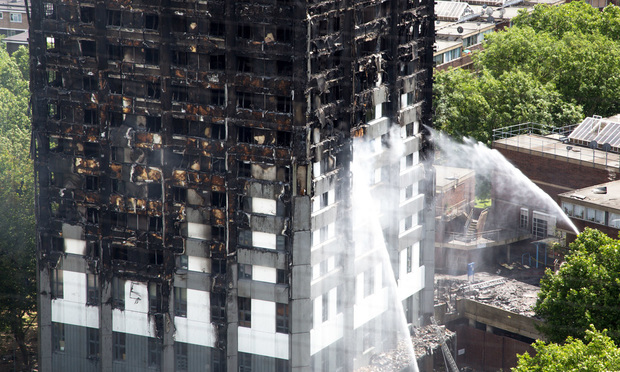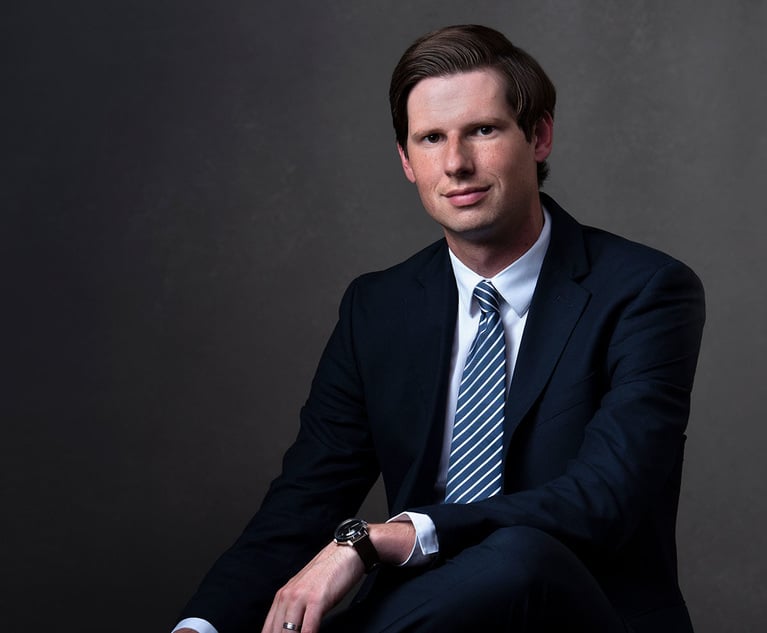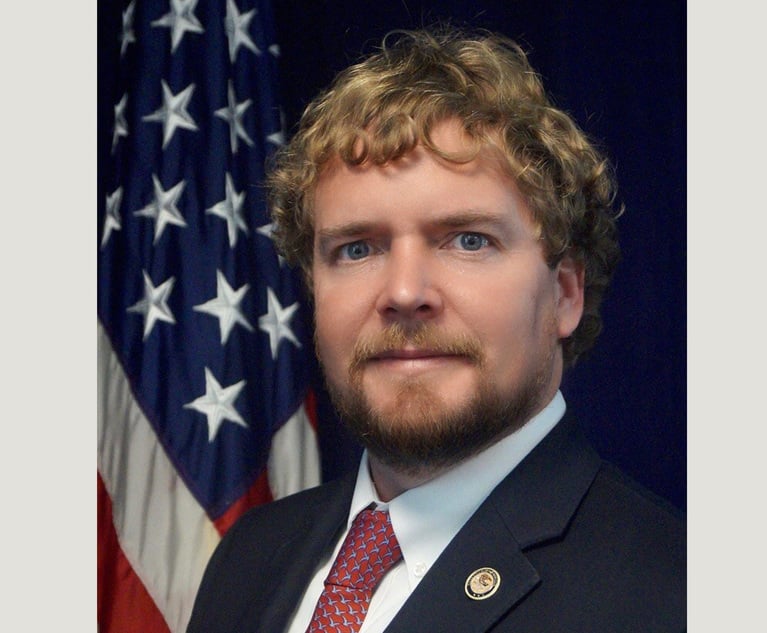Grenfell Tower Fire Defendants Take Fight to Federal Court
Companies sued in Philadelphia over the deadly 2017 fire in London's Grenfell Tower have taken the litigation to federal court, where a new fight is shaping up over what plaintiffs claim is an effort by defendants to "sneak a peek" at their strategy.
July 01, 2019 at 02:04 PM
5 minute read
 A hose continues to douse the fire at Grenfell Tower on June 15 2017, in London. Photo: Thabo Jaiyesimi/Shutterstock
A hose continues to douse the fire at Grenfell Tower on June 15 2017, in London. Photo: Thabo Jaiyesimi/Shutterstock
Companies sued in Philadelphia over the deadly 2017 fire in London's Grenfell Tower have taken the litigation to federal court, where a new fight is shaping up over what plaintiffs claim is an effort by defendants to “sneak a peek” at their strategy.
Last month, Arconic, Celotex and Whirlpool removed the high-profile litigation from the Philadelphia Court of Common Pleas, where it was initially filed, to the U.S. District Court for the Eastern District of Pennsylvania. The litigation, which is said to be one of the largest products liability lawsuits in Pennsylvania history, stems from the June 2017 fire that engulfed the 24-story building in the North Kensington section of West London and left 72 dead, as well as 70 injured. The lawsuit brought claims on behalf of 177 survivors and 69 families of the deceased.
Litigating the case in Philadelphia state court would keep the litigation in the home turf of attorney Robert Mongeluzzi and his firm Saltz Mongeluzzi Barrett & Bendesky, who, along with attorneys from DiCello Levitt, filed the case. Mongeluzzi and his firm are known for handling large-scale, complex litigation, including taking a leading role in the record-breaking litigation over a Salvation Army building collapse in Center City Philadelphia, which resolved in Philadelphia court with a $227 million settlement in 2017.
However, after a flurry of recent filings, including a brief filed Monday, it is the plaintiffs who are now contending that the defendants are trying to “circumvent the normal filing rules in an effort to gain a tactical advantage.”
The latest allegations, which at their core deal with filing deadlines, hint at just how contentious the issue of jurisdiction may become in this litigation.
In mid-June, Arconic, which made the allegedly problematic cladding on the building, removed the case to federal court, contending that district courts have jurisdiction under the Class Action Fairness Act of 2005 and because the citizenship of the plaintiffs allegedly makes the parties diverse. After Celotex, the company that made the tower's allegedly defective insulation, filed a response to the complaint, Arconic and Whirlpool, which made the refrigerator where the fire started, filed a motion seeking to extend the deadlines for providing their responses to the complaint.
Although the plaintiffs opposed the deadline extension, U.S. District Judge Michael Baylson of the Eastern District of Pennsylvania agreed to push the defendants' deadline to July 30—about 30 days after the responses were initially due.
The plaintiffs, however, are scheduled to file their remand motion by July 19, which is more than 10 days before the defendants' new deadline for responding to the complaint. It is this overlap in the deadlines that give rise to the plaintiffs' most recent allegations that the defendants are jockeying for an unfair strategic advantage in the litigation.
On Monday, the plaintiffs filed a motion seeking to extend the deadline for filing their motion to remand. In the nine-page motion, the plaintiffs contended that the defendants accused them of attempted “forum shopping,” and argued that the defendants sought the extension to gain “a tactical advantage in wanting a sneak peek at plaintiffs' potential remand arguments.”
“Plaintiffs therefore respectfully submit that good cause exists and requests that this honorable court preserve the sequence of pleadings and events dictated by 28 U.S. C. Section 1447(c) and the Federal Rule of Civil Procedure 12,” the plaintiffs said in the motion.
The plaintiffs' motion seeks to extend the deadline for filing a remand motion until August 16.
From the day the lawsuit was announced, jurisdiction was expected to be hotly contested.
Attorneys who spoke with The Legal in early June largely said chances are good the case will remain in Pennsylvania, but they also noted that the plaintiffs claims delved into issues of general and specific jurisdiction that Pennsylvania appellate courts are currently grappling with.
To establish jurisdiction, the plaintiffs argued that both Arconic and Celotex are headquartered in Pennsylvania, and that the companies designed and marketed the allegedly defective products there. They have also contended that jurisdiction has been established under Pennsylvania's unique business registration law, in which companies are required to consent to jurisdiction when registering to do business.
DLA Piper attorney Nancy Shane Rappaport, who is representing Arconic, did not immediately return a call seeking comment. Jones Day attorney Leon DeJulius Jr. is representing Whirlpool. Jones Day did not immediately return a message seeking comment.
Jeffrey Goodman of Saltz Mongeluzzi Barrett & Bendesky declined to comment about a pending motion.
Saint-Gobain Corp. was sued in the case, allegedly doing business as Celotex. Rachel Passaretti-Wu of Dechert is representing Saint-Gobain Corp. In a statement, a spokeswoman for Saint-Gobain said it was improperly sued in the case, contending it did not design, market or manufacture any of the products used at Grenfell Tower, and that it does not do business as Celotex.
This content has been archived. It is available through our partners, LexisNexis® and Bloomberg Law.
To view this content, please continue to their sites.
Not a Lexis Subscriber?
Subscribe Now
Not a Bloomberg Law Subscriber?
Subscribe Now
NOT FOR REPRINT
© 2025 ALM Global, LLC, All Rights Reserved. Request academic re-use from www.copyright.com. All other uses, submit a request to [email protected]. For more information visit Asset & Logo Licensing.
You Might Like
View All

Superior Court Directs Western Pa. Judge to Recuse From Case Over Business Ties to Defendant
3 minute read

Trending Stories
- 1Kirkland Is Entering a New Market. Will Its Rates Get a Warm Welcome?
- 2African Law Firm Investigated Over ‘AI-Generated’ Case References
- 3Gen AI and Associate Legal Writing: Davis Wright Tremaine's New Training Model
- 4Departing Attorneys Sue Their Former Law Firm
- 5Pa. High Court: Concrete Proof Not Needed to Weigh Grounds for Preliminary Injunction Order
Who Got The Work
J. Brugh Lower of Gibbons has entered an appearance for industrial equipment supplier Devco Corporation in a pending trademark infringement lawsuit. The suit, accusing the defendant of selling knock-off Graco products, was filed Dec. 18 in New Jersey District Court by Rivkin Radler on behalf of Graco Inc. and Graco Minnesota. The case, assigned to U.S. District Judge Zahid N. Quraishi, is 3:24-cv-11294, Graco Inc. et al v. Devco Corporation.
Who Got The Work
Rebecca Maller-Stein and Kent A. Yalowitz of Arnold & Porter Kaye Scholer have entered their appearances for Hanaco Venture Capital and its executives, Lior Prosor and David Frankel, in a pending securities lawsuit. The action, filed on Dec. 24 in New York Southern District Court by Zell, Aron & Co. on behalf of Goldeneye Advisors, accuses the defendants of negligently and fraudulently managing the plaintiff's $1 million investment. The case, assigned to U.S. District Judge Vernon S. Broderick, is 1:24-cv-09918, Goldeneye Advisors, LLC v. Hanaco Venture Capital, Ltd. et al.
Who Got The Work
Attorneys from A&O Shearman has stepped in as defense counsel for Toronto-Dominion Bank and other defendants in a pending securities class action. The suit, filed Dec. 11 in New York Southern District Court by Bleichmar Fonti & Auld, accuses the defendants of concealing the bank's 'pervasive' deficiencies in regards to its compliance with the Bank Secrecy Act and the quality of its anti-money laundering controls. The case, assigned to U.S. District Judge Arun Subramanian, is 1:24-cv-09445, Gonzalez v. The Toronto-Dominion Bank et al.
Who Got The Work
Crown Castle International, a Pennsylvania company providing shared communications infrastructure, has turned to Luke D. Wolf of Gordon Rees Scully Mansukhani to fend off a pending breach-of-contract lawsuit. The court action, filed Nov. 25 in Michigan Eastern District Court by Hooper Hathaway PC on behalf of The Town Residences LLC, accuses Crown Castle of failing to transfer approximately $30,000 in utility payments from T-Mobile in breach of a roof-top lease and assignment agreement. The case, assigned to U.S. District Judge Susan K. Declercq, is 2:24-cv-13131, The Town Residences LLC v. T-Mobile US, Inc. et al.
Who Got The Work
Wilfred P. Coronato and Daniel M. Schwartz of McCarter & English have stepped in as defense counsel to Electrolux Home Products Inc. in a pending product liability lawsuit. The court action, filed Nov. 26 in New York Eastern District Court by Poulos Lopiccolo PC and Nagel Rice LLP on behalf of David Stern, alleges that the defendant's refrigerators’ drawers and shelving repeatedly break and fall apart within months after purchase. The case, assigned to U.S. District Judge Joan M. Azrack, is 2:24-cv-08204, Stern v. Electrolux Home Products, Inc.
Featured Firms
Law Offices of Gary Martin Hays & Associates, P.C.
(470) 294-1674
Law Offices of Mark E. Salomone
(857) 444-6468
Smith & Hassler
(713) 739-1250





